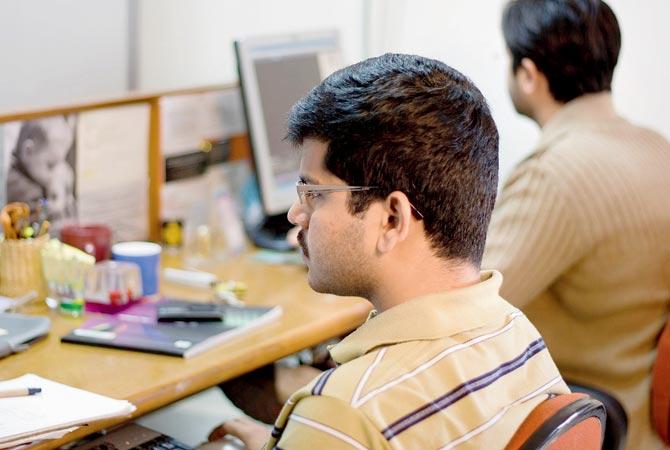A survey says we clock in 14 hours of work every day - the highest in the world. Two creative artistes weigh money against having a life

Raman Iyer and Ankita Chowfin had full-time jobs, before they decided to make the shift. Pic/Ashish Raje, location courtesy/All Elements Cafe
It's been a while since musician Raman Iyer woke up before noon. After eons, the 31-year-old admits to have dragged himself out of his bed by 9 am, to meet us at a Bandra café on a rainy morning. Iyer's day job begins only at 3 pm, rehearsing with the indie band Kabir Cafe, where he plays the mandolin. The group practices thrice a week for around five hours, reserving weekends for shows. This gives Iyer ample time to catch up on sleep, read and, most importantly, cook. Ankita Chowfin, 32, who joins us for coffee, works as a freelance assistant director, and has been rigorously putting in over 12 to 14 hours at work daily. Today, isn't going to be any different, she informs.
ADVERTISEMENT
Earlier this week, a study conducted across 77 cities by Swiss investment bank UBS, revealed that the Maximum City works the hardest in the world, with an average Mumbaikar investing 3,315 hours a year. Vietnam's Hanoi, Mexico City and New Delhi — with 2,691, 2,622 and 2,511 hours respectively — come a close second. So, does Mumbai love its work so much that it's blinded by the hours it puts in, or do we toil because money is still scarce?
Before life happened
Iyer, a BMM graduate from KC College, tried his hands at three different jobs, before finding his calling as a musician. "While in college, I remember the guest faculty glorifying the idea of overworking. They'd talk about media jobs involving graveyard shifts and surviving on caffeine and cigarettes," Iyer recalls. After Iyer graduated, he, however, chose a corporate job, working as content writer for an online platform. He left it within a year, because he hated the tedium of clocking in nine hours daily, while his contribution to the job was not more than four hours. "I was wasting both the company's and my time." He later took on a job as associate promo producer for a production house, churning 36 promos a week. "There were days when I would not come home for at least three days. There was lot of work, but no creativity," he remembers. He later found his métier with advertising, rising up the ranks soon — from senior copy writer to creative art director by 2013. "But, it had its overworking sprees. When there was a pitch or a shoot, you had no sense of weekends, space or timing. The mind was never at rest." Chowfin, a graduate of Sophia College, worked for four years with a renowned television and film production house, as associate director, recalls, "I was called by the boss at 3 am, as if it was the most normal thing to do. People didn't respect my time or space. I felt like I had sold my soul."

Representation pic
While they were moving up the ladder, Iyer and Chowfin's long working hours brought along a few setbacks. Chowfin started getting migraine attacks, while Iyer developed ulcers. "At the time, we didn't have time to think about what we were missing on," says Iyer. "I would never pick calls from friends or family, and I would feel proud of it. Being busy, gave me a sense of ego boost." "In retrospect, it seems like we had taken everything for granted, including our mind and body," adds Chowfin. According to the medical journal BMJ (British Medical Journal), "one of the most important physiological problems associated with shift work and the night shift in particular, is that working, eating, and sleeping phases are changed". The health effects include "reduction in quality and quantity of sleep, widespread complaints of fatigue, anxiety, depression, and increased neuroticism". BMJ also cites "increasing evidence of adverse cardiovascular effects and risk of spontaneous abortion, low birth weight, and prematurity."
Making the career shift
Having had enough of the saas-bahu drama, Chowfin, quit everything in 2011, to pursue her Masters in international relations from London. When she returned, she decided to work as a freelancer, instead. Nothing changed. "Only now, I'm mostly working from home and in my pyjamas," she says. "People think working as a freelancer is easy. Let me clarify, it's tough. You work as hard as a regular employee, and your money doesn't even come on time. Sometimes, I have to take on multiple projects to make ends meet. Worst, there is no job security," says Chowfin, who lives with her husband, a film director, in Versova. "The only say I have is when I choose not to take up a project. Even here, losing out on a good project due to want of time, can make you feel very guilty."
Iyer, who gave up his fat cheque and plush Worli residence, and rented an apartment in Borivli after he decided to pursue his music career full time, says life has never looked better. He says that what worked in his favour, was that he came from a separated family and had more or less, been on his own since his early teens. "This made me less accountable to anyone. However, some of my band members came from big families, and so the decision to quit their jobs, wasn't an easy one to make." Today, Iyer lives with his partner in a 2BHK flat in Chembur which they share with another friend, and says he makes enough to live reasonably well in the city. "I can take care of a dog and have never seen a local train station in three years," he says. This, despite working just three to four hours daily. But, the five-member band, which has travelled 11 countries till now, including the US, UK, Zimbabwe, Israel, UAE among others, has seen days of penury. "All of this involved hard work, dedication and time. The only difference is that we clocked in fewer number of hours," he says. "When I had a job, I didn't have time for anything. Now, I use my spare time doing things I like. I wake up at 1 pm, read, cook, listen to music and do other fun things, all without an agenda," says Iyer. Chowfin adds, "While I am working long hours, I at least am my own boss. I know when to stop and take time out to pursue other interests, like working on my art. I also plan my vacation first and take on projects accordingly."
Why do we work so hard?
What Iyer and Chowfin learnt from their own experiences and continue to do so, is that the average Mumbaikar is in the city only to work. "Mumbai's work culture is a way of life. People only come to the city to work. So, they don't mind stretching themselves," says Iyer, adding, "I know of auto and taxiwallahs, who work multiple shifts. They don't mind burning themselves out without realising how many lives they are putting at risk." Another reason why people work long hours is because they want to miss the rush hour, says Chowfin. Iyer admits he has done that too. "When I had a job, I would leave post 8 pm to avoid crowded stations. I would instead spend time chilling in the canteen or in front of my computer," says Iyer, adding, that they then give the employees more targets to meet.
"Both the employer and employee need to be sensitised about the perils of working long hours. Employers should set rules about the time spent at work space, and also learn to be flexible. The employee, on the other hand, should take a stand for themselves. Today, if someone tells me, you have to spend more time at work, I am in a position to tell them, 'Sorry, I have to go and take care of my cats at home'," says Chowfin. Iyer points out how London, in an attempt to ease traffic during peak hours, has been encouraging work-from-home culture. "This saves company resources, while de-clogging traffic," he says. "With the kind of technology we have, the same work can be done without sitting in the office space. But, companies here make it mandatory to clock in certain number of hours daily," he adds. "The problem with most Mumbaikars is that they suffer from the 'good child syndrome,' which I like to call the Amol Palekar syndrome. Palekar glorified the obedient man image in his films. You need to learn to be rebel, because truth is that we are all irreplaceable," says Iyer. Chowfin puts it aptly, "The company is entitled to your work. It is not entitled to your soul. It's time we act, before we become a slave culture."
3,315
The no. of hours an average Mumbaikar works a year. Hanoi, Vietnam, second on the list, clocks in over 500 hours lesser
 Subscribe today by clicking the link and stay updated with the latest news!" Click here!
Subscribe today by clicking the link and stay updated with the latest news!" Click here!







